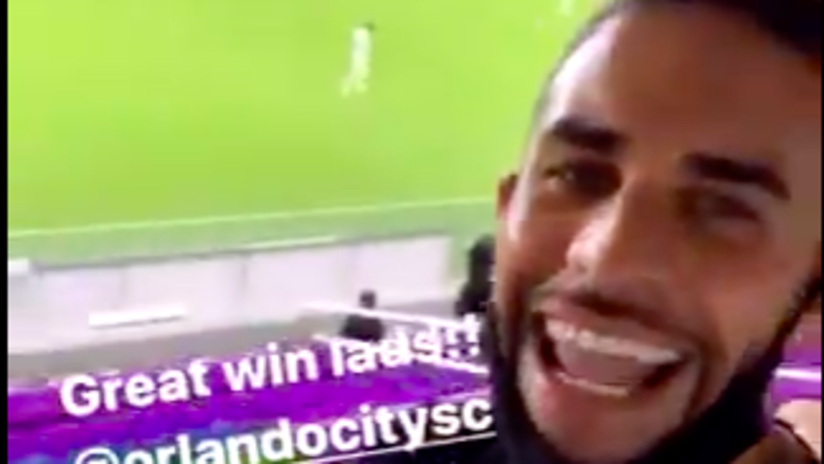When I say the words “Atlanta United,” what do you think of, and who?
For most of their short existence the Five Stripes have cultivated a strikingly distinct identity, an aggressive, high-tempo style executed by a murderer’s row of talent, particularly Latin American spearheads like Josef Martinez and Miguel Almiron, wrapped in the bold packaging of a billion-dollar stadium marvel and an organizational ethos of glitzy ambition.
The question is tougher to answer today.
Like a partygoer wallowing in the throes of a nasty hangover, the 2018 MLS Cup champions and 2019 U.S. Open Cup winners find themselves adrift below the Eastern Conference playoff line as interim coach Stephen Glass works to get the ship back on course. The stagnation that was once easy to blame on head coach Frank de Boer has lingered, perhaps even metastasized, since his dismissal after a three-and-out run at the MLS is Back Tournament.
A 5W-11L-4D record with 19 points from 20 matches presently adds up to 12th place in the Eastern Conference, and they’re 2W-7L-4D since the start of September. Their galling home loss to D.C. United on Sunday was a hammer blow, and a confidence-shorn squad now must dig out a decent point haul from a three-game closing slate that includes tough trips to playoff sides Orlando (Wednesday at 7:30 p.m. ET on FS1) and Columbus on Decision Day.
Highlights: Atlanta 1, D.C. United 2
Ample postmortems have been and will continue to be conducted on ATLUTD’s decline; in that vein The Athletic’s Felipe Cardenas and the crew at Dirty South Soccer have posted important, comprehensive work in recent weeks. The elevator-chat version is this: High turnover has caused a marked drop in overall roster quality, intertwined with dwindling organizational momentum and a corresponding loss of identity.
Eight of the 14 players who took the field in Atlanta’s memorable title-winning defeat of the Portland Timbers less than two years ago are no longer with the club. Greg Garza, Miguel Almiron, Michael Parkhurst, Darlington Nagbe, Leandro Gonzalez Pirez, Julian Gressel, Tito Villalba and Chris McCann have retired or been traded, transferred or cut. The likes of Justin Meram, Flo Pogba, Mikey Ambrose and Brek Shea cycled through over the past year.
Most devastatingly of all, the most important holdover from that 2018 league-winning side, striker Josef Martinez, has missed most of this season to a torn ACL. It’s part of the nature of MLS that a Designated Player of such quality tends to be difficult or impossible to fully replace, and so it has proven for ATLUTD.
Club VP Carlos Bocanegra might point out that other such structural challenges are in play here. Salary-capped leagues in general, and MLS in particular, tend to make it difficult to keep a top team together, because successful players earn bonuses and pay raises that eat up more of the budget. Gressel’s case is instructive in this regard.
“We’re in a tough situation here in a salary cap league,” Bocanegra said after trading the German-American to D.C. United in January. “When you look at the other leagues around the world, when a player outperforms their contract, you can increase it and keep them on your roster. Here, we have limits so we can only increase so many people before we run out of space.”
Alas for the 17s (ATL’s shorthand for their loving supporters), most of the newer arrivals have not lived up to the standards previously set. Pity Martinez came and went in awkward, untimely fashion. Ezequiel Barco appears permanently snakebit. Matheus Rossetto, Jake Mulraney, Emerson Hyndman, Adam Jahn, Cubo Torres, Jurgen Damm, Fernando Meza, Brooks Lennon – all bring various skills and attributes to the table and shouldn’t bear sole responsibility, but would admit themselves that results and performances indicate a collective backsliding.
Beyond lost quality, such turnover has a multiplier effect because team culture and cohesion take a hit too, undermining the foundation that elevates individual output. Dirty South Soccer's thorough statistical analysis shows an array of data heading in the wrong direction down in Georgia, and ATL's precipitous drop in expected goals created per game and expected goal difference per game is stark:
Analysis Evolved's Eliot McKinley notes that while the Five Stripes kept most of their championship group together for 2019, they basically blew it up over the ensuing year, entering this season with the second-highest turnover in the league, effectively creating an expansion-type scenario:
The next logical question: How much of this was a so-called "success tax" imposed on Atlanta, and how much was by choice? And which choices were Bocanegra’s, as opposed to De Boer’s as he adjusted the squad towards his preferences? Bocanegra has also cited declining productivity from incumbents.
“We’re accountable with who we bring in,” Bocanegra said last month. “Six or seven guys that we’ve had on championship teams are not playing up to the level that we expect of them to play. That also needs to change.”
It may be safe to say that a confluence of factors led ATLUTD into their current predicament. Now they’ve got three games left to produce a corresponding response strong enough to salvage this season. It will take something special to head off the prospect of yet another offseason overhaul.








